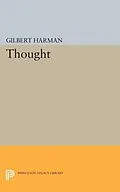Thoughts and other mental states are defined by their role in a functional system. Since it is easier to determine when we have knowledge than when reasoning has occurred, Gilbert Harman attempts to answer the latter question by seeing what assumptions about reasoning would best account for when we have knowledge and when not. He describes induction as inference to the best explanation, or more precisely as a modification of beliefs that seeks to minimize change and maximize explanatory coherence.
Originally published in 1973.
The Princeton Legacy Library uses the latest print-on-demand technology to again make available previously out-of-print books from the distinguished backlist of Princeton University Press. These editions preserve the original texts of these important books while presenting them in durable paperback and hardcover editions. The goal of the Princeton Legacy Library is to vastly increase access to the rich scholarly heritage found in the thousands of books published by Princeton University Press since its founding in 1905.
Autorentext
Gilbert Harman
Inhalt
- Frontmatter,
- Preface,
- Contents,
- Chapter 1. Introduction,
- Chapter 2. Reasons and Reasoning,
- Chapter 3. Mental Processes,
- Chapter 4. Thought and Meaning,
- Chapter 5. Truth and Structure,
- Chapter 6. Thought and Language,
- Chapter 7. Knowledge and Probability,
- Chapter 8. Knowledge and Explanation,
- Chapter 9. Evidence One Does Not Possess,
- Chapter 10. Conclusions as Total Views,
- Chapter 11. Inference in Perception,
- Chapter 12. Inference in Memory,
- References,
- Index,
